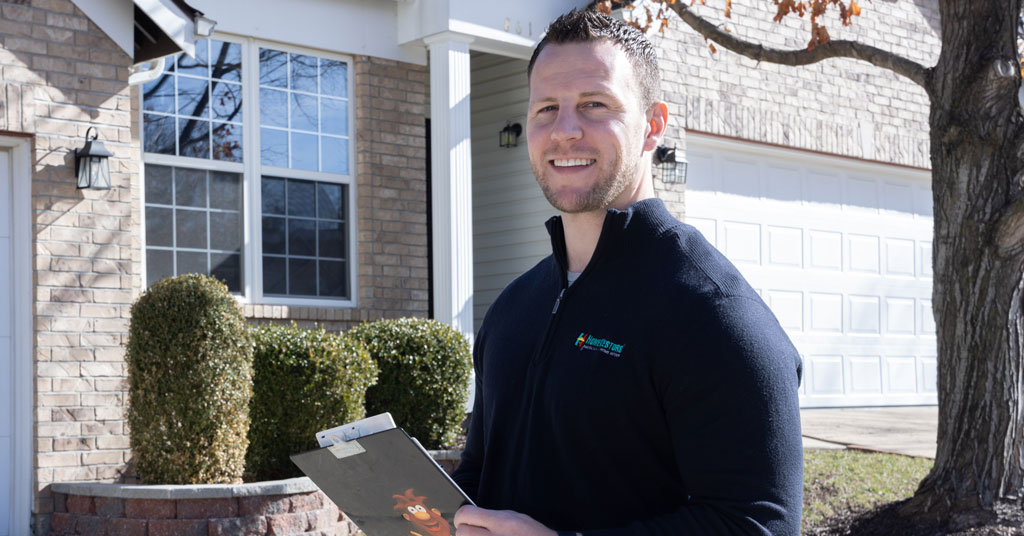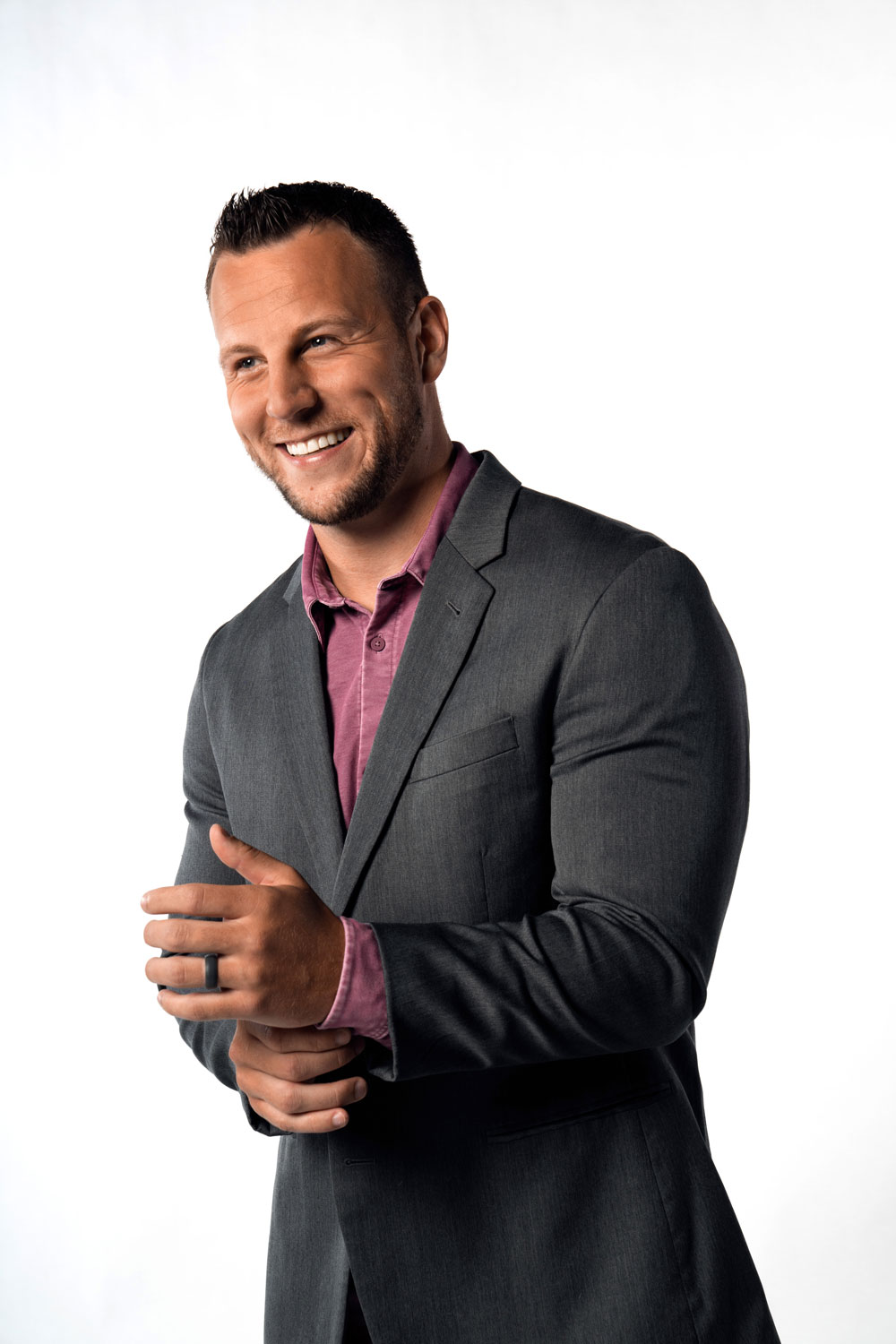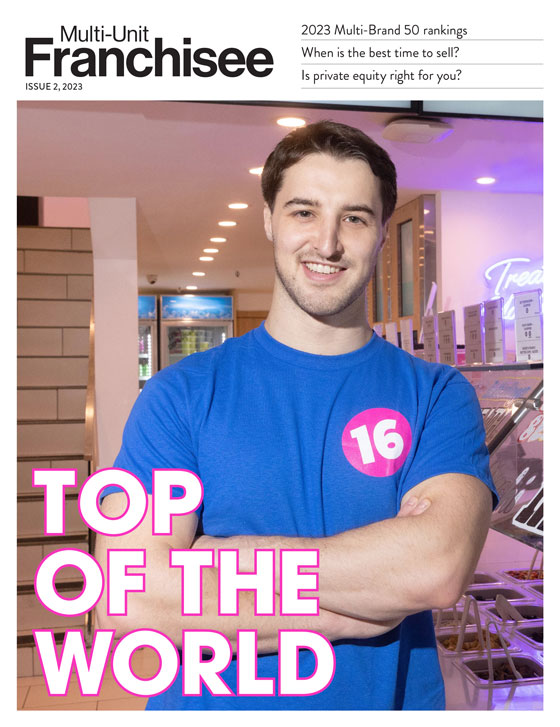Building a Nest Egg: A career-ending injury led T. J. Moe from the NFL to franchising

Name: T. J. Moe
Title: Owner
No. of units: 2 Smoothie King, 1 HomeVestors
Age: 32
Family: Married, 2 kids
Years in franchising: 8
Years in current position: 8
When T. J. Moe was growing up he and his dad talked business all the time, but professional football was his first goal. He made it, but not for very long—nowhere near the length of time needed to earn him the kind of income he’d counted on having as a nest egg after football. Instead, he found himself having to employ his business education much sooner than he’d planned. That’s when he turned to franchising—in particular to franchises that in one way or another provided him with what he needed to start building that nest egg anew.
A friend in Chicago had a HomeVestors franchise and introduced Moe and his older brother, Scotty, to the system. For a brief time the brothers, now partners, worked with that friend, learning the system. Just 3 months later they opened their own HomeVestors franchise in St. Louis.
Moe and his brother also are Smoothie King franchisees with 2 stores. Their thinking was that Smoothie King would provide a reliable income, while HomeVestors allowed them to do something beyond just running a business. It’s turned out well, and Moe is invested in continuing to expand the business, with no plans to exit anytime soon.
“In general, the tool that people use to go from poverty to stability is to buy a house. It is the American Dream,” he says. And he happens to be in St. Louis—not a growing city, but a place where houses can be bought and renovated for far less than in many other major metropolitan areas. Moe and his brother are buying homes in areas of the city where property neglect has left many houses in dire need of renovation. Their most recent renovation took a home that had been left open for anyone to come in and converted it into a rental property that quickly found new renters—two nurses. “It’s now contributing to the local economy,” Moe says. “St. Louis is a vibrant market.”

PERSONAL
First job: Archway Industrial Coatings, laying decorative rock over driveways.
Formative influences/events: My parents are married and both poured their love and energy into my life since the first day I can remember. My father coached my football teams starting when I was 8 and continued through high school. My parents brought me to a Christian church as a kid, where I developed my beliefs and values. My brother is 6 years older than I am. We come from a blended family, so we didn’t grow up in the same home. When he went to college, I came to visit for a full week. Without that bonding time, I don’t think we ever would have started this business together.
Key accomplishments: Missouri Football Gatorade Player of the Year in high school, 3-year starter and captain at the University of Missouri, second team All-Big 12 Wide Receiver.
Biggest current challenge: Time management. There are a lot of opportunities available, but it is a challenge trying to balance those opportunities with raising two kids under the age of two, prioritizing my marriage, and staying involved in church. I also work for BlazeTV on a show called “Fearless with Jason Whitlock” that takes a fair bit of time each day.
Next big goal: Accumulating 50 rental properties. We are currently at 31. Our goal is to be at 50 by the end of 2023.
First turning point in your career: My brother and I had dabbled in rental properties since 2014. We had picked up one unit per year on average until we met a friend who had a HomeVestors franchise in Chicago. He introduced us to the system and we worked with him for a short time. Three months later, we opened our own franchise in St. Louis. In our first year, we added two rental units. We added 13 units in year two and 10 units in year three. The franchise has allowed us to begin to scale and make this a real business instead of a side hustle. My brother quit his job at a church last year to do this full-time. It’s now our primary focus each day.
Best business decision: When the pandemic hit in March 2020, many of our competitors scaled back into a “wait and see” position. We did just the opposite. We tripled our marketing within just a few months. We have found that every time we have been aggressive, we have been rewarded for it.
Hardest lesson learned: Two things. The first is that time kills all deals. We’ve lost tens of thousands of dollars by not pursuing an opportunity or lead quickly enough. The second is that good contractors/vendors are worth their weight in gold.
Work week: Seven days a week. It’s flexible, but there are no real days off in these businesses.
Exercise/workout: Seven days a week. I run, lift weights, and try to stretch some every day.
Best advice you ever got: Delayed gratification is the key to building wealth. To be something you’ve never been before, you have to do something you’ve never done before.
What’s your passion in business? Building. Money is great, but there is nothing that replaces the feeling of growth in the business.
How do you balance life and work? Not great.
Guilty pleasure: Gas station candy.
Favorite book: The Bible>
Favorite movie: “Remember the Titans.”
What do most people not know about you? I once showered with Tom Brady. (I signed with the Patriots in 2013 and spent the season on injured reserve.)
Pet peeve: People with no self-awareness.
What did you want to be when you grew up? Professional football player.
Last vacation: Cancun, Mexico in November 2022.
Person I’d most like to have lunch with: Warren Buffett.
MANAGEMENT
Business philosophy: To focus on delivering high-quality, value-adding renovations to homes, with the goal of improving the standard of living for homeowners and improving the city, while also generating a profit.
Management method or style: Pragmatist.
Greatest challenge: Empathizing with others. I don’t seek a ton of empathy for myself and therefore don’t naturally give it to others. It’s a constant focus to make sure I can empathize with employees and customers so they feel valued. If people don’t feel valued, they don’t want to work for you or do business with you.
How do others describe you? I’m an 8 on the Enneagram. That means I have to be very careful in my approach because some can see me as aggressive and intimidating. I’m generally confident, assertive, and logical.
One thing I’m looking to do better: Implement better systems so I am less involved in day-to-day management of our renovations.
How I give my team room to innovate and experiment: As long as the job meets our standards, we don’t micromanage how it gets done.
How close are you to operations? At Smoothie King, I don’t oversee the daily operations. Our manager does that and one of the other owners oversees him. At HomeVestors, I directly oversee the operations. If I’m not in tune with every aspect of the daily operations, things get lost quickly and we struggle. At any given time we may be working on retailing or renting 10 or more houses. Without proper systems and follow-up, chaos ensues.
What are the two most important things you rely on from your franchisor? Advertising. The biggest benefit of a franchise is the national brand recognition. When you open the doors, people are already familiar with the product. The other thing is access to other franchisees for advice and gathering market information. Sometimes it’s very difficult to differentiate whether an issue I’m having is a problem unique to me and my approach or a system-wide issue. Access to other franchisees brings clarity to that problem.
What I need from vendors: Priority. We spend several hundred thousand dollars at The Home Depot each year. Because of that, we have two direct contacts that allow us to get what we need in a timely fashion and often delivered to the work site. Someone is always offering to go above the normal service because of the amount of money we spend each year. That has allowed us to be more efficient in the business, buy more houses, and spend even more money with those vendors.
Have you changed your marketing strategy in response to the economy? How? We tripled our marketing within just a few months after the pandemic started.
How is social media affecting your business? Our target market at HomeVestors is typically older people who don’t spend a lot of time on social media. We still have a social media presence, but not as heavy as many of the other marketing avenues.
How do you hire and fire? My brother and I do all of the hiring and firing personally.
How do you train and retain? At Smoothie King, it tends to be a young person’s job. The average employee is 16 to 18 years old. That means there is frequent turnover as kids have different seasons in their lives (sports seasons, summer break, etc.) and then go on to college. Aside from that built-in challenge, getting dedicated employees has been the most difficult part of the business since the pandemic started. This seems to be a nationwide problem. We have raised the pay offering and made sure to create a work environment that people want to be a part of, but it’s still our biggest challenge that we haven’t yet been able to solve at a high level.
How do you deal with problem employees? Depending on the situation, they usually get a couple of chances to course correct, but as soon as I identify that they are an issue, I’m considering how to find a suitable replacement. Toxic people destroy team morale. One toxic person can, and often does, make the good members of the team want to find a different job.
Fastest way into my doghouse: Disrespect toward me, others in the company, or customers. Disagreements are acceptable and welcome, but disrespect in the workplace isn’t tolerated.
COVID-19
How did Covid-19 affect your business? The marketing price per contract that we purchase is significantly higher now than before the pandemic.
How have you responded? My brother and I started our HomeVestors franchise in St. Louis in March 2020—the exact month the pandemic started. Many of the other franchisees in the market dropped their marketing dollars significantly, and several stopped marketing entirely. We decided to double our marketing immediately. Within 3 months it had tripled and has continued to rise since then. Each month we have seen continued growth. It’s more difficult to get houses, but the ones we get turn big profits. At Smoothie King, it’s tougher to gauge. A Club Fitness gym opened up directly across the street in 2020 and drove a lot of sales to us. We had a record year during the pandemic in both Smoothie King and HomeVestors.
What changes do you think will be permanent? Our advertising budget soared. That’s unlikely to return to previous levels. It is now more than 10 times what it was before Covid.
BOTTOM LINE
Annual revenue: N/A.
2023 goals: 45 purchases with 15 rental property acquisitions.
Growth meter: How do you measure your growth? Gross sales at Smoothie King. At HomeVestors, our goal is to accumulate rental properties, so that makes the measurement a bit different. We have to retail enough houses to float the business and take home a profit, but our primary objective is to keep as many rental properties as possible.
Vision meter: Where do you want to be in 5 years? 10 years? In 5 years, our goal is to have 75 rental properties. In 10 years, our goal is to have 150 to 200 rental properties. These are the long-term investments that will provide residual income and build wealth. If we retailed every single house, we could make a great income today, but our goal isn’t to accumulate as much cash on hand as possible, it’s to build wealth as quickly as possible. That’s done through rental properties.
Are you experiencing economic growth in your market? St. Louis is a great real estate market. It’s a top 25 media market. All of the studies show that housing affordability is near the top of the list compared with median income in the area. We saw a nice uptick in both rental and home prices, but there hasn’t been a big contraction yet. We’re expecting a minor drop in prices, but more like 1% to 3%; that compares with national projections as high as 10% to 12%, according to some banks and real estate companies. Our plan is to stay aggressive in buying.
How do changes in the economy affect the way you do business? It’s always a good time to buy homes for the right price. The real estate market is in an interesting spot since the market crash of 2008. Once people got their feet back under them and started buying homes again, the demand has surpassed the supply by quite a lot. A balanced market would keep a 6-month supply of homes always listed on the market for sale. If it’s more than a 6-month supply, it’s a buyer’s market. If it’s less, it’s a seller’s market. The last time there was a 6-month supply in St. Louis was September 2015. As of January 2023, we are at a 1.6-month supply. We have a seriously low inventory, which means that homes are going to sell if priced correctly. Therefore, the economy around us has less of an impact than in many other places because of the minimal supply of homes. Everyone needs a place to live, so homes will continue to sell.
How do you forecast for your business? For HomeVestors, there are quite a few factors: interest rates, housing inventory, supply chain, and which way prices are trending in the market.
What are the best sources for capital expansion? Private lenders, personal cash, and local banks.
Experience with private equity, local banks, national banks, other institutions? Why/why not? We have primarily used private lenders and local banks.
What are you doing to take care of your employees? We do quarterly reviews with each employee. We have an open-door policy so that any issue, concern, or idea can be addressed at any time. But even if nothing is happening, we check in quarterly to make sure people are content with their role, schedule, other employees, etc.
How are you handling rising employee costs (payroll, minimum wage, healthcare, etc.)? While it’s unpopular to admit, those costs are passed on to the consumer as much as they can be. If they weren’t, the business couldn’t survive. At Smoothie King, the price per smoothie has increased, while at HomeVestors the initial purchase price for the homes tends to be lower. We certainly take a hit as well because all the cost can’t be passed on to the consumer, but a fair bit of it does get passed on. The other way to compensate for the lost profit is more business. That’s why we’ve increased our marketing so much. If we do far more volume, that helps keep the numbers at an acceptable range.
How do you reward/recognize top-performing employees? At Smoothie King, we have competitions each week for sales, and they’re rewarded for that. We also keep tabs on anyone willing to be available to cover extra shifts, stay late, and show initiative in growing the store. Those people often get bonuses and pay raises, along with priority when they do need some time off. It pays to be a team member who cares about the success of the business.
What kind of exit strategy do you have in place? There will always be buyers available with Smoothie King. The brand is great and known nationwide. We have people approach us all the time about purchasing the stores. At HomeVestors, we also don’t need a real exit strategy. The rental properties are owned by me and my brother, Scotty. The business is an avenue to create income and wealth, and not really something we view as an asset to sell. We certainly could sell it, but that’s not in the plans at any point. The brand has infinitely more value to us as franchisees than it ever could as an asset to sell.
Share this Feature
Recommended Reading:
Comments:
comments powered by Disqus| ADVERTISE | SPONSORED CONTENT |
FRANCHISE TOPICS
- Multi-Unit Franchising
- Get Started in Franchising
- Growth
- Operations
- Open New Units
- Leadership
- Marketing
- Technology
- Legal
- Awards
- Rankings
- Trends
- Featured Franchise Stories
FEATURED IN

Multi-Unit Franchisee Magazine: Issue 2, 2023
| ADVERTISE | SPONSORED CONTENT |
$225,000
$30,000




 The multi-unit franchise opportunities listed above are not related to or endorsed by Multi-Unit Franchisee or Franchise Update Media Group. We are not engaged in, supporting, or endorsing any specific franchise, business opportunity, company or individual. No statement in this site is to be construed as a recommendation. We encourage prospective franchise buyers to perform extensive due diligence when considering a franchise opportunity.
The multi-unit franchise opportunities listed above are not related to or endorsed by Multi-Unit Franchisee or Franchise Update Media Group. We are not engaged in, supporting, or endorsing any specific franchise, business opportunity, company or individual. No statement in this site is to be construed as a recommendation. We encourage prospective franchise buyers to perform extensive due diligence when considering a franchise opportunity.